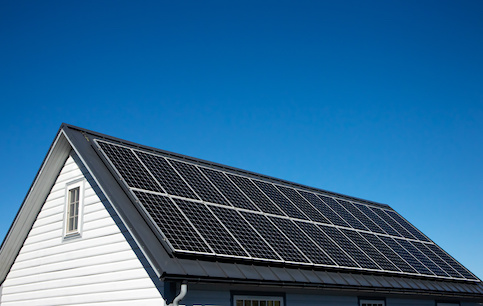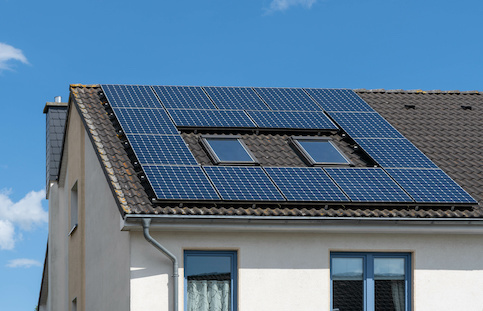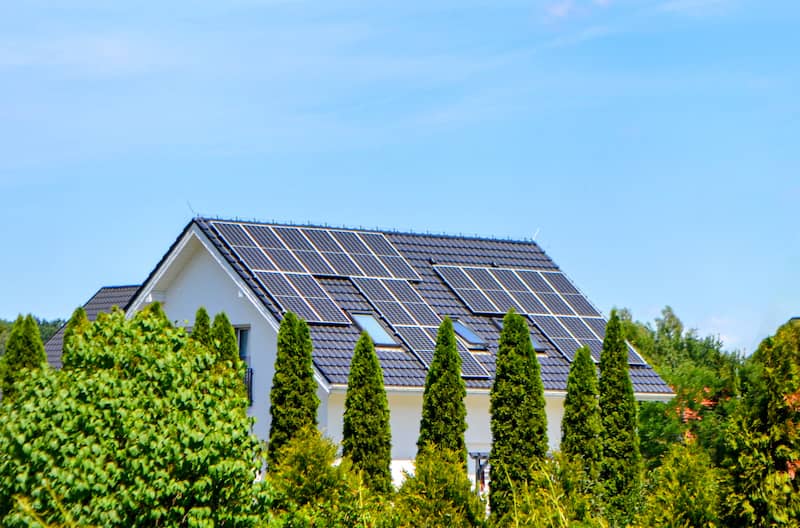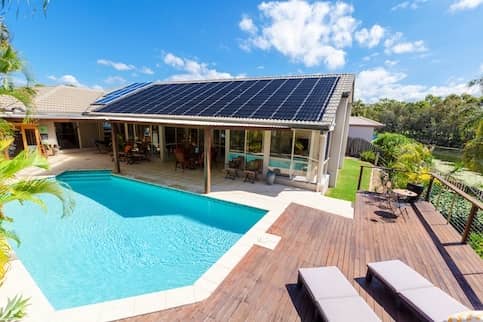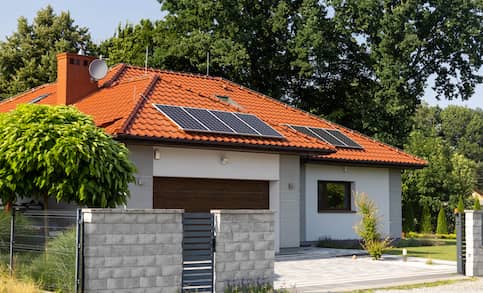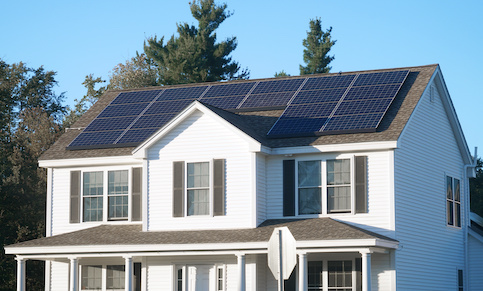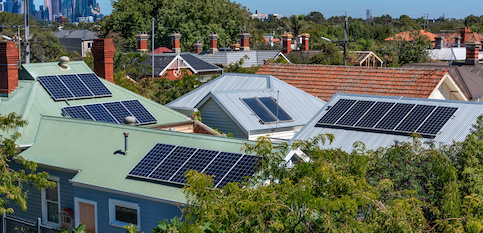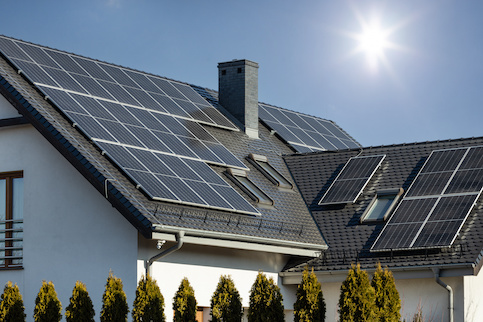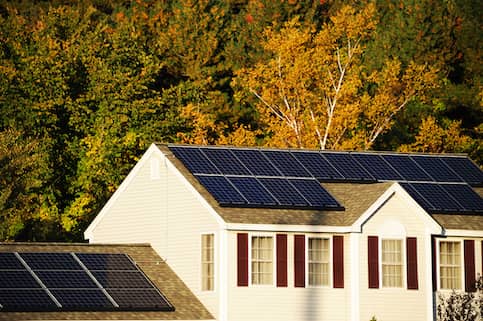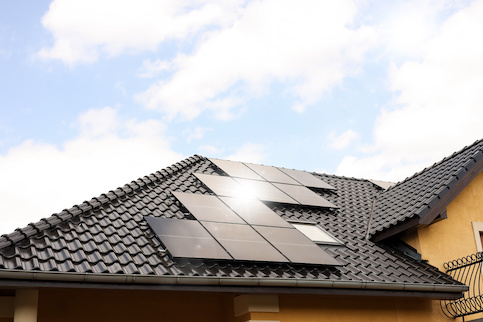Like many things, energy costs have been increasing. Electricity rates have risen around 8% on average from 2021 to 2022, according to estimates from the U.S. Energy Information Administration (EIA). An increase in coal and natural gas prices is causing electricity rate hikes. However, as electricity prices increase, so do your savings from solar panels.
Along with saving you money, going solar could also be an excellent way to increase your home’s value and help your home stand out on the real estate market. That’s because your property will be more eco-friendly and have significantly lower energy bills.
Does Solar Increase Home Value?
Installing solar panels in a home helps lower electricity bills, protect against rising energy costs and earn money back on your investment. Homeowners find that solar power makes their homes more desirable on the market than those without solar power.
As energy prices increase, more home shoppers are concerned about high utility bills. Yet, having a solar system can virtually eliminate power bills. In addition, many home buyers are concerned about their impact on the environment and reliance on fossil fuels. Therefore, a rooftop solar system really stands out to these home shoppers.
See What You Qualify For
Buy A Home
Discover mortgage options that fit your unique financial needs.

Refinance
Refinance your mortgage to have more money for what matters.
Tap Into Equity
Use your home’s equity and unlock cash to achieve your goals.
How Much Do Solar Panels Increase Home Value?
Numerous studies show that installing a rooftop solar energy system increases home value. According to Rocket Homes data, solar powered homes are 24.7% more likely to sell over asking price.
In addition, most homeowners can take advantage of the 30% federal solar tax credit. A tax credit is a dollar-for-dollar reduction in taxes owed to the IRS. For example, a $15,000 solar power system can qualify for up to a $4,500 tax credit. In many cases, the increase in home value and national, state or local incentives can save homeowners significant money, plus you can enjoy years of lower energy bills before you sell.
Factors That Influence Home Value With Solar Panels
There are several factors and benefits that influence home value with solar panels. Here are just a few.
Location
The sale premium for solar homes varies somewhat by the market. Also, the solar incentives vary by location. Although the 30% federal solar tax credit is available throughout the United States, some incentives are available through specific utility companies or local and state governments. For example, California’s Self-generation Incentive Program provides generous solar battery rebates.
Energy Savings
How much a household can save with solar panels varies depending on the solar panel output, electricity rates, and home energy use. According to the EIA, the average U.S. home consumes 10,632 kilowatt hours (kWh) of electricity annually.
Although the U.S. Bureau of Labor Statistics reported that the average cost per kWh was 16.6 cents in October 2022, electricity rates vary widely across the country and are highest in California, Hawaii and the Northeast. The average household can easily save $100, but homes with higher electricity rates or home energy use can save $200 or more.
Installation Costs
The cost of solar panel systems varies by area, partially because the installation fees can vary between solar companies, and there are different grades of solar equipment. For example, premium solar panels are usually more expensive because they’re more efficient or have better warranties.
When considering the cost, some features will be more appealing to homebuyers than others. For example, longer labor and equipment warranties can offer peace of mind to home buyers.
System Ownership
Homeowners see a much more significant increase in the resale value of their properties when they own the solar system instead of leasing the solar panels. Unfortunately, solar leases can complicate the sale of a home because the homeowner needs to either pay off the lease or get the new homeowner to assume responsibility for lease payments.
Age Of Solar Power System
The lifespan of a solar system is about 25 to 30 years. If you have an older system on your home or one that isn’t in good working order, it might not increase your home value much, if at all. However, a newer solar system in pristine condition is very appealing to many home buyers.
Effective Marketing
It may be helpful to highlight the solar system in marketing materials when selling your home. In addition, creating a one-page information sheet on the PV system can be useful for potential buyers. Include the age of the system, relevant warranty information, annual electricity production and the average annual utility savings.
You can obtain the production data if the array has a solar monitoring platform. Your proposal or contract with the solar installer should provide information on the labor, solar panel and equipment warranties.
How To Get The Most Value From Solar Panels
When considering if solar panels are right for your home, it’s helpful to think about how you’ll get the most value from your system through lower utility bills, solar incentives and increased home value.
- Consider your location. Identical solar systems in two different locations will not produce the same amount of electricity because solar energy production varies by the climate and available sunlight. Unfortunately, if your property is too shaded, it might not be a good fit for solar panels.
- Examine the cost of power: Electricity rates vary considerably by location. For example, a homeowner in Boston may pay 29 cents per kWh, compared to 13 cents in Chicago or 41 cents in San Diego. If you live in an area with high electricity rates and that has a net metering program through the electric company, a solar system will pay for itself in savings more quickly.
- Choose the right types of solar panels. How much electricity your solar system will produce will depend partially on your solar panels. High-efficiency solar panels can generate more electricity per square foot but often have a higher price. Likewise, some solar panels perform better than others in hot weather, partial shade or low light.
- Find out if you have financial incentives in your state. Although the tax credit is available in all 50 states, some local and state governments and utility companies offer additional incentives and rebates. Refer to the DSIRE database for information on state and local solar energy incentives.
- Hire a qualified solar installer: Like any other home improvement project, it’s critical to have the right people complete the work. Look for a solar contractor with a good reputation and a proven track record.
- Consider solar warranties: Labor, solar panel and inverter warranties help protect your investment. The lifespan of your solar energy system is around 25 to 30 years, and warranties help ensure that your system will produce clean energy for many years. However, warranties vary considerably among equipment manufacturers.
Solar Panel Home Value FAQs
Let’s explore some of the common questions homeowners have about how solar panels impact selling a home.
Do solar panels hurt the resale value of my home?
No, a solar system in good condition can considerably raise your property value by thousands of dollars.
Are buyers looking for homes with solar panels?
A rooftop solar system can be very appealing in the real estate market. Many home buyers are concerned about the cost of owning a home, and utility costs are a major long-term expense. Likewise, environmentally concerned buyers will appreciate that the solar system reduces their greenhouse gas emissions and reliance on fossil fuels. Therefore, it is helpful to highlight the solar system in marketing materials when selling your home.
How do solar panels affect property tax?
Currently, 36 states offer property tax exemptions for solar systems. These allow solar homeowners to exclude the added value of the solar panels from the valuation of their property for tax purposes.
Do bigger solar installations present a better value add than smaller systems?
It is best to size the solar system to cover the home’s electricity use and not more, unless you plan to start using more power soon. In areas with net metering, the utility company will compensate solar homeowners for the surplus electricity they feed to the grid. The electric company usually bills households for the “net” electricity use, which is the difference between how much the solar system produces and the home consumes.
However, many utility companies will only compensate homeowners enough to net out their own usage. Therefore, if you oversize your solar system, it won’t result in greater utility bill savings.
How much money will I save in energy costs after installing solar panels?
Your electric bill savings vary widely depending on the energy use of the home, how much power the solar system generates, and your electricity rates. The average U.S. home consumes 886 kWh of power each month. If your home uses a lot of electricity and your rates are higher than 15 cents per kWh, you can save $150 a month or more. In addition, many solar homeowners save more money in the summer, especially if they run the air conditioner a lot.
The Bottom Line
Solar panels can add considerable value to your home because they reduce your electricity bills and the impact of future electricity rate hikes, producing a good return on investment. A solar-powered home is especially appealing to buyers who want greater energy independence and less reliance on fossil fuels.

Sarah Lozanova
Sarah Lozanova is an environmental journalist and copywriter and has worked as a consultant to help large corporations become more sustainable. She is the author of "Humane Home: Easy Steps for Sustainable & Green Living," and her renewable energy experience includes residential and commercial solar energy installations. She teaches green business classes to graduate students at Unity College and holds an MBA in sustainable management from the Presidio Graduate School.
